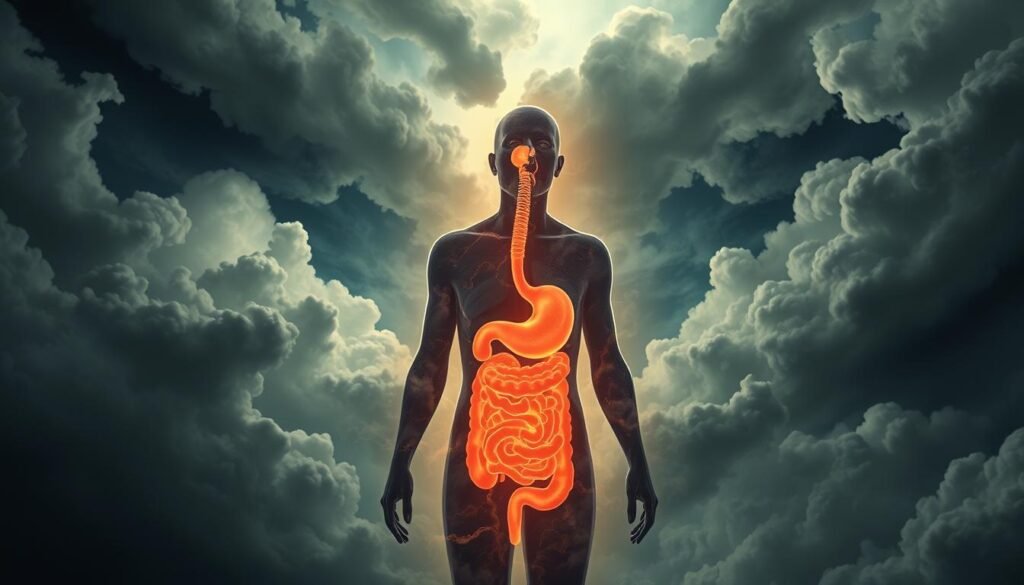Did you know stomach issues are often linked to stress and anxiety? Over 60% of people with anxiety also have gut problems. This shows how closely our mind and digestion are connected. Stress and worry can cause many digestive issues, like bloating, diarrhea, and even IBS.
These digestive problems can get worse if we eat too much or drink a lot of caffeine when anxious. Understanding the link between our mental and digestive health is key. It helps us treat both better.
Treating our mind and gut together can make our lives a lot better. In this article, we’ll explore how our behavior affects our gut and ways to feel better. We’ll look at the link between mental health and digestion, and share tips to improve both.
Key Takeaways
- Over 60% of individuals with anxiety report gastrointestinal issues.
- Chronic stress can lead to gut health problems like IBS and acid reflux.
- Unhealthy coping mechanisms during anxiety often worsen digestive issues.
- Recognizing the mind-gut connection can lead to more effective treatment.
- Effective management of anxiety can significantly enhance gut health.
- Seeking therapy can be beneficial for those struggling with mental health and digestive challenges.
The Connection Between Anxiety and Digestion
Anxiety and digestive health are closely linked, thanks to the brain-gut connection. This connection shows how our feelings can affect our stomachs. It’s important to know this to understand how anxiety changes the way our gut works.
Understanding the Brain-Gut Connection
The brain-gut connection means the brain and digestive system talk to each other. This talk controls how our bodies react. When someone is anxious, this chat can get messed up. This may cause stomach problems.
- Low serotonin levels, linked to anxiety, decrease digestive efficiency.
- The fight-or-flight response triggers adrenaline release, altering nutrient processing.
- Long-term anxiety can result in imbalances within intestinal bacteria.
- Increased stomach acid due to stress impacts food digestion.
- Digestive problems can intensify anxiety symptoms, causing a vicious cycle.
How Stress and Anxiety Affect Gut Motility
Gut motility is how muscles in our stomach move food along. Stress can slow this down. This can cause symptoms like constipation, bloating, or diarrhea. Studies show that too much stress might mess up the ENS. This can lead to problems like irritable bowel syndrome (IBS).
There are ways to make your gut work better if you’re anxious. These steps can help:
- Adopting easy-to-digest foods
- Prioritizing quality sleep
- Engaging in regular physical activity
Tackling anxiety effects on your stomach is key for better health. It helps people feel better overall.
Common Gastrointestinal Anxiety Disorders
Gastrointestinal anxiety disorders include various conditions linked closely with anxiety. Irritable Bowel Syndrome (IBS) and acid reflux are notable for their widespread impact. They connect deeply to our emotional health. Knowing how they tie to anxiety helps in tackling digestive issues.
Irritable Bowel Syndrome (IBS) and Anxiety
IBS shows through symptoms like stomach pain, bloating, and changes in bowel movements. About 8.3% of people have these gastrointestinal problems. They greatly affect anxiety levels. Those with IBS often see their symptoms spike with stress. This shows the tight link between anxiety and digestive problems.
Changing diet and lifestyle can help reduce these symptoms.
Acid Reflux and Anxiety
Acid reflux happens when stomach acid moves up into the esophagus. It tends to get worse during stressful times. Anxiety-driven actions, like overeating or choosing the wrong foods, can increase the reflux. This leads to discomfort and annoyance.
Identifying what sets off acid reflux and taking steps to avoid these triggers helps. Also, tackling anxiety through mindfulness and stress reduction helps relieve this issue.

Other Digestive Issues Related to Anxiety
Anxiety can trigger many stomach problems. These issues show how closely our minds and guts are linked. People may feel various symptoms that stress makes worse. We will look into specific problems, like constipation and food sensitivities, that come from anxiety.
Constipation as a Response to Stress
Constipation is a common problem when we’re stressed. Those with a lot of anxiety might notice their digestion slows. This leads to rare and uncomfortable trips to the bathroom. Stress hormones play a big part in this, showing how our feelings affect our health. It’s important for folks with this problem to know why it happens.
Digestive Upsets and Emotional Factors
Emotions can spark stomach issues like aches, nausea, and bloating. Anxiety turns into physical signs that mess with digestion. Many don’t see how much stress impacts their stomach. This shows why handling anxiety is key to feeling less stomach pain.
Food Sensitivities Worsened by Anxiety
People already sensitive to some foods may feel worse under stress. Anxiety makes their reactions to these foods stronger. This means taking care of your mind can help your stomach too. It’s about finding balance in what you eat and how you feel.

| Digestive Issue | Common Symptoms | Connection to Anxiety |
|---|---|---|
| Constipation | Infrequent bowel movements, abdominal discomfort | Increased stress slows digestion |
| Digestive Upsets | Nausea, bloating, stomach pain | Emotional distress triggers symptoms |
| Food Sensitivities | Gas, cramping, diarrhea | Anxiety can worsen reactions |
Stress-Induced Digestive Problems
Stress often shows up as digestive issues, like indigestion. This includes discomfort and abdominal pain, often linked to anxiety. Mental health affects our body, causing digestive problems when we’re stressed. When anxious, our body slows down stomach emptying. This can lead to stomachaches, heartburn, and nausea.
Understanding Indigestion and Anxiety
Evaluating stress-induced digestive problems requires knowing how anxiety affects indigestion. Our gut is called the second brain because it’s full of neurons. Stress doesn’t directly cause gut diseases. Instead, it makes symptoms worse. Anxiety might cause bloating, increased large intestine activity, and urgent bowel movements.
The Role of Gut Flora Disruption
Gut flora health is key to digestion. Stress can upset this balance, leading to more digestive issues. A troubled mind can lead to an unhealthy gut. Fixing gut flora can involve mindful eating, regular exercise, and using probiotics. To understand how anxiety affects digestion, visit this link.

| Factor | Impact on Digestive Health |
|---|---|
| Stress | Delays stomach emptying and increases symptoms of indigestion |
| Anxiety | May exacerbate gastrointestinal symptoms and disrupt gut flora |
| Exercise | Can improve anxiety symptoms and subsequently support digestion |
| Probiotics | Help restore gut flora balance and alleviate digestive discomfort |
Anxiety-Triggered Bowel Issues
When anxiety flares up, it often brings bowel issues with it. Diarrhea is a common sign of this. Stress plays a big role in how our gut works. It can lead to problems that make our mental health worse, too.
Diarrhea and Its Psychological Correlation
Diarrhea often goes hand in hand with stress. Studies show that many with irritable bowel syndrome (IBS) also have mental health disorders. Anxiety, for example, can make gut problems worse. This creates a tough cycle of fear about going out or being social.
When we get anxious, the connection between our brain and gut gets stronger. This can make us need to go to the bathroom more often. Getting help is key. Therapies like cognitive behavioral therapy (CBT) can help ease some IBS symptoms.
Nausea and the Anxiety Link
Nausea is another common issue when anxiety hits. It works through the same gut-brain connections. High stress levels can lead to feeling nauseous. This is the body’s way of reacting to mental distress.
Eating mindfully can really help with these symptoms. It helps us eat more calmly and can reduce anxiety. It’s good for our overall gut health, too. Addressing anxiety disorders is crucial in dealing with these gut problems. Taking care of our mental health helps manage these issues. For more info on digestive health, check out this resource here.
The Psychological Impact on Digestion
Mental health and gut health are closely linked. This is especially true when talking about how anxiety affects our digestion. People with anxiety might face various digestive problems. This makes it hard to break the cycle of discomfort. Knowing about this link is key for those struggling with gut issues.
Behavioral Patterns Affecting Gut Health
Anxiety can change how people act in ways that hurt their gut health. For example, they might change what and when they eat or avoid certain foods. These changes can mess up digestion. Studies show that people with gut conditions like ulcerative colitis (UC) and irritable bowel syndrome (IBS) often feel more anxious or depressed than those who are healthy. Anxiety is much more common in people with UC or IBS, highlighting how our minds affect our guts.
Addressing Mental Health to Improve Digestion
Improving mental health is important for better digestion. Anxiety can make gut symptoms worse, causing more worry and poor mental health. Treatments like mindfulness and cognitive behavioral therapy can help. Changing what you eat can also make a difference. Focusing on mental health can really improve digestion issues. Linking brain and gut health offers a way to treat these problems together. To learn more about this connection, click here.
| Condition | Prevalence of Anxiety | Prevalence of Depression | Average HADS Anxiety Score |
|---|---|---|---|
| IBS | 19% | 5.4 | 8.1 |
| UC | 42% | 38.9% | 8.5 |
| Healthy Controls | 22.2% | 11.1% | 3.8 |
Stress Management for Gut Relief
Handling stress well can make your digestion better. Knowing how to manage stress can make you feel overall better and help your gut too. It involves using ways to lower anxiety that help your gut’s health.
Techniques to Reduce Stress and Anxiety
To get a healthier gut, it’s key to use good anxiety lowering methods. Such techniques are:
- Mindfulness practices that encourage present-moment awareness
- Deep breathing exercises to regulate stress responses
- Physical activities like yoga, running, or swimming, which can help alleviate abdominal pain by regulating intestinal contractions
- Psychotherapy, especially with professionals familiar with IBS symptoms and anxiety
Regular exercise helps many with their gut issues. Hypnosis is also found useful, helping relieve symptoms without meds or changing diets.
Dietary Changes for Better Gut Health
To improve your gut health, making certain diet changes is beneficial. These include:
- Avoiding processed foods that can irritate the digestive tract
- Increasing fiber intake to promote regular bowel movements
- Opting for fresh fruits and vegetables that support overall digestion
Eating right is very important to handle stress and improve your health. By eating better and managing stress, you may see fewer anxiety-related gut issues.
| Strategy | Description | Benefits |
|---|---|---|
| Mindfulness | Practices that develop awareness of the present moment | Improved emotional regulation and gut relief |
| Deep Breathing | Controlled breathing techniques to reduce stress | Decreased anxiety and improved digestive function |
| Exercise | Regular physical activity, including yoga and running | Enhanced gut motility and relief from abdominal pain |
| Balanced Diet | Focus on whole foods, avoiding processed options | Improved digestive health and less stress |
Using these strategies can help manage stress and fix the link between mind and gut health. Those looking to understand stress and digestion can check out therapy or community programs. For more details, visit this link.
Coping with Anxiety-Related Gut Symptoms
Anxiety often shows up as gut problems in many people. Knowing the signs of such symptoms is key. It helps in handling both your mind and body better.
Learning about these signs is the first step towards easing the discomfort. It’s all about finding the right ways to deal with it.
Recognizing the Signs
Knowing what to look out for can really make a difference. If you are feeling nervous and have stomach issues, it might be anxiety. Here are things you might notice:
- Feelings of nervousness or anxiety that accompany digestive issues
- Flatulence, stomach upset, or ongoing nausea
- Bloating or a sensation of warmth in the stomach
- Increased frequency of urination or bowel movements
- Rare but extreme symptoms such as gagging or vomiting
Pay attention to these signs to act quickly. Knowing what triggers your symptoms is key in handling them well.
Seeking Professional Help
If your gut problems due to anxiety get too much, it’s important to seek help. Talking to a doctor can open up specific treatments. These can focus on both your mental and gut health.
- Therapy for mental health support
- Dietary recommendations for gut health improvement
- Medication to manage symptoms and underlying conditions
By taking action early, you can feel a lot better. Regular doctor visits help keep track of any issues. This leads to better mental and digestive health.
Conclusion
Anxiety and digestion are deeply connected. This affects our health a lot. Knowing this helps us see how important our stomach health is for our mental state. Studies show about 20 percent of Americans often have stomach pain from conditions like Irritable Bowel Syndrome (IBS). This is closely linked with anxiety and depression. By understanding our gut health, we can deal with anxiety and its effects on our digestion better.
Looking after both our mind and stomach is key to feeling better. Diets with probiotics and other special diets can help with anxiety and make our guts healthier. Also, new treatments like vagus nerve stimulation are changing how we treat mental health. It’s important for us to know how crucial our mental health is. And to look for treatments that help both our mind and gut.
In short, anxiety and digestion affect each other a lot. People with anxiety should also look after their gut to help ease their mental health issues. For more information, check out articles like this one that go into more detail about these complex issues.